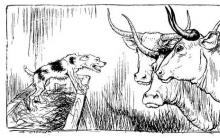Molchalin Alexey Stepanych- Famusov's secretary, who lives in his house, as well as Sophia's admirer, who despises her in his soul. M. translated by Famusov from Tver. The hero's surname expresses his main feature - "wordlessness". It was for this that Famusov made M. his secretary. In general, the hero, despite his youth, is a full-fledged representative of the "past century", as he has assimilated his views and lives by his principles. M. strictly follows the covenant of his father: "to please all people without exception - the owner, the boss, his servant, the janitor's dog." In a conversation with Chatsky, M. sets out his life principles - "moderation and accuracy." They are that "at my age one should not dare to have one's own judgment." According to M., you need to think and act as is customary in the "famus" society. Otherwise, they will gossip about you, and, as you know, "evil tongues are worse than pistols." M.'s romance with Sophia is also explained by his willingness to please everyone. He obediently plays the role of an admirer, ready to read love stories with Sophia all night long, listen to the silence and trills of nightingales. Sophia does not like M., but he cannot refuse to please the daughter of his boss.
Skalozub Sergey Sergeyevich- in his image, the “ideal” Moscow groom is bred - rude, uneducated, not very smart, but rich and pleased with himself. Famusov reads S. as her daughter's husband, but she considers him "not the hero of her novel." At the time of his first visit to Famusov's house, S. talks about himself. He participated in the war of 1812, but he received the order "on the neck" not for military exploits, but on the occasion of military celebrations. S. "aims at the generals." The hero despises bookish wisdom. He speaks derogatoryly of his cousin who reads books in the countryside. S. tries to embellish himself externally and internally. He dresses in army fashion, "tightening" with straps so that his chest is a wheel. Having understood nothing in Chatsky's accusatory monologues, he, nevertheless, joins his opinion, saying all sorts of nonsense and nonsense.
Sofia Pavlovna Famusova- Famusov's 17-year-old daughter. After the death of her mother, she was brought up by "Madame", an old Frenchwoman Rosier. S.'s childhood friend was Chatsky, who also became her first love. But over the 3 years of Chatsky's absence, S. has changed a lot, as her love has changed. The formation of S. was influenced, on the one hand, by Moscow habits and customs, on the other hand, by the books of Karamzin and other sentimentalist writers. The girl imagines herself the heroine of a "sensitive" novel. Therefore, she rejects the caustic and bold Chatsky, as well as Skalozub - stupid, but rich. S. chooses Molchalin for the role of a Platonic admirer. In his house, S. does not have the opportunity to develop mentally. The only thing she can do is to imagine herself as the heroine of the novel and act according to this role. Either she invents a dream in the spirit of Zhukovsky’s ballads, or she pretends to faint, etc. But the “Moscow” upbringing also makes itself felt. During the ball, it is she who spreads the rumor about Chatsky's madness. The romantic behavior of the heroine turned out to be just a mask, her true essence is this nature of a Moscow young lady. At the end of the comedy, S. is punished. She learns about the "betrayal" of Molchalin, who flirts with Liza and speaks impartially about S. In addition, Famusov, having learned about his daughter's affair with his secretary, decides to remove S. from Moscow "to the village, to my aunt, to the wilderness, to Saratov" .
Famusov Pavel Afanasyevich- Moscow gentleman, "manager in a government house." Sophia's father, friend of Chatsky's father. The events of the play take place in his house. F. - one of the brightest representatives of the "past century." In one of his monologues, F. praises Moscow customs, unchanged from century to century. Here, according to the father, "and honor to the son"; here who has "two thousand family souls, He and the bridegroom." Moscow ladies can be sent to "command in the Senate", so they are "informed" about everything; Moscow daughters “simply cling to the military”, allegedly “because they are patriots”; Moscow old men, called to solve serious cases, "argue, make some noise ... and disperse." In the "famus" society, everything is based on connections: "well, how not to please your dear little man." This model of life seems ideal to F. and other members of Moscow society, they consider it the only correct one and do not want any changes. F. is two-faced. He claims that he is "known for his monastic behavior", but at the same time hits on the maid Lisa. F. is afraid of all new trends. During a conversation with Chatsky, he plugs his ears so as not to hear bold speeches. F.'s main enemy is learning, as it introduces changes into the calm Moscow life. The hero's dream is "to take all the books and burn them." Like a typical Moscow gentleman, F. is deceived by everyone who is not lazy. And daughter Sophia, and secretary Molchalin, and maid Lisa. The last appearance of the hero on stage is timed to coincide with the final meeting of Sofia and Molchalin. Seeing young people together, F. is horrified. He accuses the “dissolute” of his daughter of the “new” Moscow, which is infected with free ideas and the “spirit of the Kuznetsk bridge” (that is, Paris). At first, F. threatens to publicize this shameful case (“I will give it to the Senate, the Ministers, the Sovereign”), but then he recalls that his daughter will be gossiped in all the houses of Moscow. In tearful horror, F. exclaims: “What will Princess Marya Alekseevna say !!!” The opinion of this princess means more to F. than the opinion of the tsar himself, because in the "famus" society she occupies one of the main places.
Chatsky Alexander Andreevich- A young gentleman Representative of the present century. Progressive person, well educated, with broad free views; true patriot. After a 3-year absence, Ch. again comes to Moscow and immediately appears in Famusov's house. He wants to see Sophia, whom he loved before leaving and with whom he is still in love. But Sophia meets Chatsky very coldly. He is perplexed and wants to find the reason for her coldness. Staying in Famusov's house, the hero is forced to fight with many representatives of the "Famus" society (Famusov, Molchalin, guests at the ball). His passionate accusatory monologues are directed against the order of the age of "submission and fear", when "he was famous for whose neck bent more often." When Famusov offers Molchalin as an example of a worthy person, Ch. utters the famous monologue “Who are the judges?” In it, he denounces the moral patterns of the "past century", mired in hypocrisy, moral slavery, etc. Ch. considers many areas in the life of the country: public service, serfdom, education of a citizen, education, patriotism. Everywhere the hero sees the prosperity of the principles of the "past century". Realizing this, Ch. experiences moral suffering, experiences "woe from the mind." But to no lesser extent, the hero also experiences "woe from love." Ch. finds out the reason for Sophia's coldness towards him - she is in love with the insignificant Molchalin. The hero is offended by the fact that Sophia preferred him to this "pathetic creature." He exclaims: "Silents rule the world!" Very upset, Ch. goes to a ball in the Famusov's house, where the flower of Moscow society has gathered. All these people are a burden to Ch. Yes, and they can not stand the "stranger". Sophia, offended by Molchalin, spreads a rumor about the hero's madness. The whole society gladly picks it up, putting forward the hero's free-thinking as the main charge against Ch. At the ball, Ch. utters a monologue about the "Frenchman from Bordeaux", in which he exposes the slavish admiration for everything foreign and the contempt of Russian traditions. In the finale of the comedy, Ch. reveals the true face of Sophia. He is disappointed in her just like in the rest of the "famus" society. The hero has no choice but to leave Moscow.
The play "Woe from Wit", written by Alexander Griboedov, was not immediately published, and its appearance on the stage was long in coming. Griboedov's comedy did not escape the difficult relationship with censorship, since at that time the play carried a rather sharp character and bold content.
In the comedy, the author touches upon the pressing problems of society, which have matured by the beginning of the 19th century. However, the moral, fundamental conflict, which is determined by the relationship with the overdue split in the society of the nobles, is correlated with the problem of perception of each other among the old and new views on the social order.
In Griboedov's play, such phenomena as "the present century" and "the past century" are revealed. Between them, a misunderstanding arises, which cannot be resolved. Famusov Pavel Afanasyevich - the paramount preacher of the "past century", acting as his main defender.
Characteristics of the hero

One of the characters in the famous comedy "Woe from Wit" by Alexander Griboyedov is Pavel Afanasyevich Famusov. The hero of the play, the main representative of the so-called Famus society, is a nobleman, a well-known landowner. In his circles, given the numerous acquaintances and connections, Famusov is a more than recognizable resident of Moscow, who serves as a manager in a government place. It is impossible to describe Famusov without mentioning his boastfulness, inherent in all noble representatives of the nobility. In addition, Pavel Afanasyevich is quite hospitable, sociable, you can call him a lover of a beautiful life "in a big way." He is indifferent to any discussion and gossip in the direction of his personality. For himself, Famusov defined his life credo as the ability to please in the right situations, as well as curry favor with those who can be useful to him. The ideal for Pavel Famusov is his uncle, Maxim Petrovich, whom his nephew strives to imitate in every possible way.

(The image of the Famus society with a characteristic noble pastime in the 19th century of that time)
Despite the fact that Famusov's wife is not alive, he also allows himself cheeky behavior, although he creates the appearance of a respectable widower. Famusov not only shows interest in the maid, but is also closely connected with the doctor.
Pavel Afanasyevich has a daughter, Sophia, whom Famusov endlessly loves and cherishes. And every opportune moment is an opportunity to remind you how much effort was invested in raising her daughter. However, it is impossible to define the image of Famusov as one-sidedly negative, because he is capable of compassion and kindness. This is confirmed by the death of his friend, whose son Famusov took to his own upbringing and treated him no worse than his own daughter. According to Famusov, marriage between people can only be possible if their combination can bring a decent financial income. Based on this, his goal is to ensure Sophia's future with a successful marriage to a rich groom.
Famusov works only with the desire to get more money, to earn recognition and subsequent titles. All the work for him is done by his secretary, and he himself does just that, putting his signature on the prepared papers.
Famusov, an avid Moscow gentleman of the 20s of the 19th century, can be attributed to ardent supporters of serfdom.
The image of the hero in the work

In the comedy play, Pavel Afanasyevich Famusov plays the role of a true opponent of educational activities, opposes all kinds of innovations, since, in his opinion, this entails a threat to his calm and prosperous life.
He motivates the dissolute behavior of Sophia's adult daughter by constantly reading books. However, reading is not the only reason that encourages this behavior.

Famusov asserts with confidence that both foreign teachers and interest in studying the arts - all this will only harm noble children, they do not need education at all, since family life does not force and does not imply its presence.
Famusov considers her own father to be the best example of his daughter, no matter how conceited it may sound.
To the image of Pavel Famusov and his society, Griboedov tried to give the most outdated landlord views and opinions, their failure, and also to emphasize the deep-rooted habits that had settled so deeply in their minds.
It is in this vein that the role of Famusov is staged on the pages of the play by A.S. Griboyedov "Woe from Wit".
Article menu:
In the world you will rarely find a doctrine that would promote violence, lies and deceit. For the most part, world dogmas affirm the principles of humanity, peacefulness and a respectful attitude towards other people, however, real life is far from these teachings.
Despite all efforts, deceit and deceit prevail in society. This trend is typical for any social groups. However, the realization that the elite of society is also not devoid of these vices of humanity is depressing - I want to believe that there is a certain ideal of society in the world and this is not a utopia.
The Famus society could very likely serve as such an ideal model, but this is not happening. With the help of exposing Alexander Chatsky, the reader learns about the vices and negative qualities of character typical of aristocrats.
The denunciation of the aristocracy takes place on the example of the manager of a state institution in Moscow, Pavel Afanasyevich Famusov. He has neither a unique biography nor a unique character - all his qualities are typical of the aristocracy of that time.
Famusov's family life
In the story, the reader gets acquainted with an already formed, mature person both biologically and psychologically.
His exact age is not indicated in the play - at the time of the unfolding of the main events, he is a man of respectable age: “In my years, you can’t squat on me,” Famusov himself says about his age.
The family life of Pavel Afanasyevich was not cloudless - his wife died, and he remarried a certain "Madame Rosier". Famusov cannot boast of a large number of successors of his family - he has one child - daughter Sonya, born from his first wife.
Famusov is not devoid of a sense of compassion - he took his friend's son Alexander Chatsky to his upbringing after the boy was orphaned. Alexander retained pleasant impressions of his teacher, and after returning from a long trip abroad, the first thing he does is pay a visit to Pavel Afanasyevich. Frankly speaking, his respect and gratitude towards Famusov is not the only reason for the visit. Chatsky is in love with Sonya and expects to marry a girl.
Based on this situation, we can conclude that Pavel Afanasyevich was a good educator, he knew how to win over Alexander at any age, otherwise Chatsky would not have sought to pay him a visit with such zeal.

However, Famusov's meeting with Chatsky became a cause for disappointment and quarrel. Alexander begins to analyze the actions and position of his teacher and comes to extremely unsatisfactory results, on his part.
Famusov Public Service
The reader gets acquainted with Famusov already when he is in the position of manager "in a government place", Griboedov does not specify how he got this position and what his career path was.
It is known that Famusov prefers to see relatives among his fellow employees: “With me, employees of strangers are very rare.”
Pavel Afanasyevich surrounded himself with relatives at work, he likes to please them with a promotion or another award, but he does it for a reason - the concept of disinterestedness is alien to Famusov.
Personal qualities and habits of Famusov

First of all, selfish motives stand out. He himself is a wealthy and wealthy person, therefore, when choosing his future son-in-law, he focuses on the growth prospects of both a career and a financial young man, because in Famusov's concept, the first is inseparable from the second.
Famusov himself is dependent on ranks, he believes that a person with a proper rank and many awards is already a priori worthy of respect.
“You, passionate for ranks” - Chatsky gives him such a description. In addition to the desire to achieve the rank, his son-in-law must also have sufficient financial security. At the same time, Pavel Afanasyevich is not interested in the morality and integrity of the young man.
Based on this position, Alexander Chatsky looks like an extremely unattractive candidate for the husband of Sonya Famusova. He left the military service, the civil service also does not arouse interest in him, of course, Chatsky has a family estate, but this does not inspire reliability and prospects in the eyes of Famusov: "He who is poor is not a match for you."
Dumbfounded by such a verdict, Chatsky still does not lose hope of reuniting with his beloved, but the further development of the conflict makes Chatsky abandon this idea.
Famusov highly appreciates the achievements of the period of the reign of Catherine II, and considers Maxim Maksimych to be the ideal person, who, thanks to his subservience and ability to please, reached heights in his career and was held in high esteem:
At the courthouse he happened to step in;
He fell, so much so that he almost hit the back of his head;
Were you to laugh; how is he?
Suddenly fell in a row - on purpose,
And the laughter is louder, it is the same for the third time.
BUT? what do you think? in our opinion - smart.
Guided by old principles, Famusov evaluates a person according to his condition, and the ability to get what he needs, even through humiliation, becomes an object of admiration.
Famusov is dismissive of the people who serve him, he experiences a certain amount of relief, scolding and shouting at his serfs. Phrases like "Donkeys! a hundred times to repeat to you? and “You, Filka, you are a straight block” is a common occurrence in his vocabulary.
By the way, constant discontent is characteristic of Pavel Afanasyevich. He is dissatisfied with the servants, dissatisfied with the new time, modern youth, science and cultural figures.
The conflict between Chatsky and Famusov
The images of Chatsky and Famusov denounce the "current century" and "the past century." Famusov adheres to a conservative look and believes that it is necessary to adhere to the orders of the past, because the ancestors were wiser than their contemporaries. Famusov spends everything in comparison "it was" and "became".
It is difficult for him to realize that the time of his ancestors has passed and the requirements of society have changed:
At fifteen, teachers will be taught!
What about our old people? - How will enthusiasm take them,
They will judge about deeds, that the word is a sentence, -
After all, pillars are everything, they don’t blow anyone’s mustache;
And sometimes they talk about the government like that,
What if someone overheard them...
In addition to such a division, the images of Famusov and Chatsky distinguish between the world of carnal pleasures and the spiritual world. Famusov and people like him are guided in life by the basic needs of the body, not caring about their spiritual and moral development. They embody a person as a representative of the animal world.
Chatsky, on the other hand, personifies the development of the spiritual and mental abilities of a person. He sincerely believes in the power of education and realizes the true meaning of science and culture.
Famusov, on the other hand, rejects the positive influence of science and education, and the kind of activity associated with science or art seems to Pavel Afanasyevich shameful and unacceptable for an aristocrat.
Thus, Pavel Afanasyevich Famusov is endowed with unattractive character traits, he is a greedy and greedy person, for him a significant indicator of the significance of a person is his wealth and rank. He is an uneducated and therefore limited person, it is difficult for him to appreciate the significance of intangible values.
Article menu:
In the world you will rarely find a doctrine that would promote violence, lies and deceit. For the most part, world dogmas affirm the principles of humanity, peacefulness and a respectful attitude towards other people, however, real life is far from these teachings.
Despite all efforts, deceit and deceit prevail in society. This trend is typical for any social groups. However, the realization that the elite of society is also not devoid of these vices of humanity is depressing - I want to believe that there is a certain ideal of society in the world and this is not a utopia.
The Famus society could very likely serve as such an ideal model, but this is not happening. With the help of exposing Alexander Chatsky, the reader learns about the vices and negative qualities of character typical of aristocrats.
The denunciation of the aristocracy takes place on the example of the manager of a state institution in Moscow, Pavel Afanasyevich Famusov. He has neither a unique biography nor a unique character - all his qualities are typical of the aristocracy of that time.
Famusov's family life
In the story, the reader gets acquainted with an already formed, mature person both biologically and psychologically.
His exact age is not indicated in the play - at the time of the unfolding of the main events, he is a man of respectable age: “In my years, you can’t squat on me,” Famusov himself says about his age.
The family life of Pavel Afanasyevich was not cloudless - his wife died, and he remarried a certain "Madame Rosier". Famusov cannot boast of a large number of successors of his family - he has one child - daughter Sonya, born from his first wife.
Famusov is not devoid of a sense of compassion - he took his friend's son Alexander Chatsky to his upbringing after the boy was orphaned. Alexander retained pleasant impressions of his teacher, and after returning from a long trip abroad, the first thing he does is pay a visit to Pavel Afanasyevich. Frankly speaking, his respect and gratitude towards Famusov is not the only reason for the visit. Chatsky is in love with Sonya and expects to marry a girl.
Based on this situation, we can conclude that Pavel Afanasyevich was a good educator, he knew how to win over Alexander at any age, otherwise Chatsky would not have sought to pay him a visit with such zeal.

However, Famusov's meeting with Chatsky became a cause for disappointment and quarrel. Alexander begins to analyze the actions and position of his teacher and comes to extremely unsatisfactory results, on his part.
Famusov Public Service
The reader gets acquainted with Famusov already when he is in the position of manager "in a government place", Griboedov does not specify how he got this position and what his career path was.
It is known that Famusov prefers to see relatives among his fellow employees: “With me, employees of strangers are very rare.”
Pavel Afanasyevich surrounded himself with relatives at work, he likes to please them with a promotion or another award, but he does it for a reason - the concept of disinterestedness is alien to Famusov.
Personal qualities and habits of Famusov

First of all, selfish motives stand out. He himself is a wealthy and wealthy person, therefore, when choosing his future son-in-law, he focuses on the growth prospects of both a career and a financial young man, because in Famusov's concept, the first is inseparable from the second.
Famusov himself is dependent on ranks, he believes that a person with a proper rank and many awards is already a priori worthy of respect.
“You, passionate for ranks” - Chatsky gives him such a description. In addition to the desire to achieve the rank, his son-in-law must also have sufficient financial security. At the same time, Pavel Afanasyevich is not interested in the morality and integrity of the young man.
Based on this position, Alexander Chatsky looks like an extremely unattractive candidate for the husband of Sonya Famusova. He left the military service, the civil service also does not arouse interest in him, of course, Chatsky has a family estate, but this does not inspire reliability and prospects in the eyes of Famusov: "He who is poor is not a match for you."
Dumbfounded by such a verdict, Chatsky still does not lose hope of reuniting with his beloved, but the further development of the conflict makes Chatsky abandon this idea.
Famusov highly appreciates the achievements of the period of the reign of Catherine II, and considers Maxim Maksimych to be the ideal person, who, thanks to his subservience and ability to please, reached heights in his career and was held in high esteem:
At the courthouse he happened to step in;
He fell, so much so that he almost hit the back of his head;
Were you to laugh; how is he?
Suddenly fell in a row - on purpose,
And the laughter is louder, it is the same for the third time.
BUT? what do you think? in our opinion - smart.
Guided by old principles, Famusov evaluates a person according to his condition, and the ability to get what he needs, even through humiliation, becomes an object of admiration.
Famusov is dismissive of the people who serve him, he experiences a certain amount of relief, scolding and shouting at his serfs. Phrases like "Donkeys! a hundred times to repeat to you? and “You, Filka, you are a straight block” is a common occurrence in his vocabulary.
By the way, constant discontent is characteristic of Pavel Afanasyevich. He is dissatisfied with the servants, dissatisfied with the new time, modern youth, science and cultural figures.
The conflict between Chatsky and Famusov
The images of Chatsky and Famusov denounce the "current century" and "the past century." Famusov adheres to a conservative look and believes that it is necessary to adhere to the orders of the past, because the ancestors were wiser than their contemporaries. Famusov spends everything in comparison "it was" and "became".
It is difficult for him to realize that the time of his ancestors has passed and the requirements of society have changed:
At fifteen, teachers will be taught!
What about our old people? - How will enthusiasm take them,
They will judge about deeds, that the word is a sentence, -
After all, pillars are everything, they don’t blow anyone’s mustache;
And sometimes they talk about the government like that,
What if someone overheard them...
In addition to such a division, the images of Famusov and Chatsky distinguish between the world of carnal pleasures and the spiritual world. Famusov and people like him are guided in life by the basic needs of the body, not caring about their spiritual and moral development. They embody a person as a representative of the animal world.
Chatsky, on the other hand, personifies the development of the spiritual and mental abilities of a person. He sincerely believes in the power of education and realizes the true meaning of science and culture.
Famusov, on the other hand, rejects the positive influence of science and education, and the kind of activity associated with science or art seems to Pavel Afanasyevich shameful and unacceptable for an aristocrat.
Thus, Pavel Afanasyevich Famusov is endowed with unattractive character traits, he is a greedy and greedy person, for him a significant indicator of the significance of a person is his wealth and rank. He is an uneducated and therefore limited person, it is difficult for him to appreciate the significance of intangible values.
One of the main characters of Griboedov's great creation "Woe from Wit" is Famusov. This is a very bright and memorable hero, so I can not describe his image and character.
Full name - Pavel Afanasyevich Famusov. This is a very rich man who is a manager in a state institution. He always uses his high position both in society and at work in order to attach all his relatives and relatives.
His wife died, leaving his daughter Sophia to him. Famusov loves his daughter very much. Therefore, he is trying to find for her a well-known groom with a high rank.
Famusov is a man who will achieve everything in this life on his own, but perhaps not in a completely honest way. Pavel Afanasyevich always flatters people whom he considers important and necessary. (For example, when he turned to Skalozub) He is also very fickle, breaks down in public for no good reason, scolds his servants. For Famusov, it is very important who and what will think of him. Pavel Afanasyevich is afraid of any changes in his life.
Such a hero with his arrogance, flattery and peculiar speech is impossible to forget.
Updated: 2017-02-14
Attention!
Thanks for attention.
If you notice an error or typo, highlight the text and press Ctrl+Enter.
Thus, you will provide invaluable benefit to the project and other readers.











At what sub-zero temperature do yeast die?
Do you know how to choose the right ripe, sweet melon?
The most beautiful surnames for girls
The rarest surnames: is yours on this interesting list?
Medicinal properties and contraindications of spices and oil of oregano Oregano in cooking